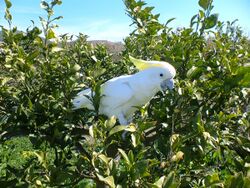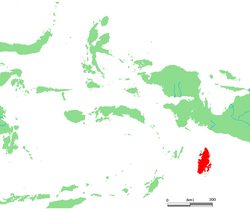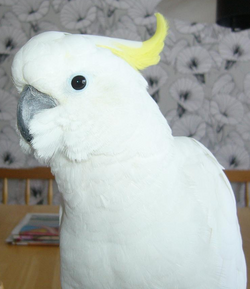Biology:Eleonora cockatoo
| Eleonora cockatoo | |
|---|---|

| |
| Scientific classification | |
| Domain: | Eukaryota |
| Kingdom: | Animalia |
| Phylum: | Chordata |
| Class: | Aves |
| Order: | Psittaciformes |
| Family: | Cacatuidae |
| Genus: | Cacatua |
| Species: | |
| Subspecies: | C. g. eleonora
|
| Trinomial name | |
| Cacatua galerita eleonora Finsch, 1863
| |

| |
| Aru Islands (in red) | |
The Eleonora cockatoo, Cacatua galerita eleonora, also known as medium sulphur-crested cockatoo, is a subspecies of the sulphur-crested cockatoo. It is native to the Aru Islands in the province of Maluku in eastern Indonesia, but has also been introduced to Kai Islands.[1][2][3] Avicultural populations are well-established in Europe and the United States.[4]
The Eleonora cockatoo was named by Otto Finsch. He discovered the subspecies in Amsterdam's Artis zoo and named it after Maria Eleonora van der Schroef, the wife of the then director of the zoo.[5] This subspecies was accepted by Gerlof Mees in 1972 and Joseph Forshaw (1989) and recognised by Edward C. Dickinson and James Van Remsen Jr. (2013).[6]
Characteristics
It is the smallest of the four subspecies of Cacatua galerita, at approx. 44 cm (17 in) long and weighing between 404–602 g (14–21 oz).[7] Apart from the size difference, the Eleonora differs from the greater sulphur crested in that it doesn't have as prominent white eyerings (they often are a pale blue), the crest of an Eleonora is often less curved and it doesn't have the pointy upper mandible,[2] which is only found in Cacatua galerita galerita. Although a smaller and lighter bird, in practice it may be difficult to differentiate this subspecies from the Triton cockatoo.[4]
The Eleonora cockatoo often has pale yellow ear patches, and yellow diffusion throughout the body, especially under the wings and tail. The Eleonora also has a bald patch behind its crest.[2]
Diet and habitat
In the wild, the Eleonora cockatoo is found in open woodlands, forests, and semi-arid forested areas, as well as partially cleared forest areas.[3] It feeds on nuts, berries, flower buds, flowers, seeds and insects.[8]
Reproduction
The breeding season of this cockatoo is mainly from September to January. The birds build their nests in a tree hollow or rock crevice. The female lays 2–3 white oval eggs, which hatch after a period of 30 days. Both parents incubate the eggs and in turn provide for the chicks. The young fledge after about 75 days. [citation needed]
Intelligence and beat perception
One notable Eleonora cockatoo is Snowball, a bird recently demonstrated to be capable of beat induction – in other words, that the bird is capable of perceiving a musical beat and dancing to it.[9]
Like all cockatoos, the Eleonora cockatoo is widely considered to be very intelligent and emotionally complex.[10]
References
- ↑ "Sulphur-crested Cockatoo (Cacatua Galerita)". Parrot Encyclopedia. World Parrot Trust. http://www.parrots.org/index.php/encyclopedia/wildstatus/sulphur_crested_cockatoo/. Retrieved 20 August 2010.
- ↑ 2.0 2.1 2.2 Decoteau, A. E. (1981). Handbook of Cockatoos. T.F.H. Publications. p. 92. ISBN 9780866227988.
- ↑ 3.0 3.1 Mulawka, Edward John (2016). The Cockatoos: A Complete Guide to the 21 Species. McFarland. p. 67. ISBN 9781476614717.
- ↑ 4.0 4.1 "Sulphur-crested Cockatoo Fact Sheet". https://www.northernparrots.com/sulphur-crested-cockatoo-fact-sheet-blog121/.
- ↑ Bolens, Bo; Watkins, Michael; Grayson, Michael (2020). The Eponym Dictionary of Birds. Bloomsbury Publishing. p. 171. ISBN 9781472982698.
- ↑ Beehler, Bruce M.; Pratt, Thane K. (2016). Birds of New Guinea: Distribution, Taxonomy, and Systematics. Princeton University Press. p. 240. ISBN 9781400880713.
- ↑ "ANIMAL BYTES — Medium Sulpher-crested Cockatoo". http://www.seaworld.org/Animal-info/animal-bytes/animalia/eumetazoa/coelomates/deuterostomes/chordata/craniata/aves/psittaciformes/medium-sulpher-crested-cockatoo.htm.
- ↑ "Birds >> Parrots >> Cockatoo — Eleonora Main Page". centralpets.com. http://www.centralpets.com/animals/birds/parrots/prt838.html.
- ↑ Patel, Aniruddh D.; Iversen, John R.; Bregman, Micah R.; Schulz, Irena & Schulz, Charles (2008-08), "Investigating the human-specificity of synchronization to music", Proceedings of the 10th Intl. Conf. on Music Perception and Cognition (Adelaide: Causal Productions)
- ↑ "Cockatoo - Eleonora :: Pets site :: Pets information". http://www.cydoniamall.com/pets/709/bird/Cockatoo.
External links
Wikidata ☰ Q333733 entry
 |



